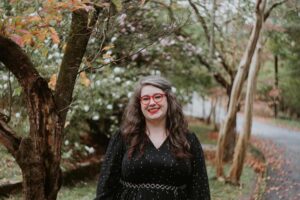When Hurricane Katrina hit Mississippi’s Gulf Coast in 2005, Sarah Torgeson, then 13 years old, evacuated her hometown of Waveland and returned after the storm to what she described as a dead zone. She watched as her 71-year-old grandfather navigated the hurricane and began to wonder about aging adults and their systems of support during environmental disasters.

Now, as a Ph.D. candidate in the Department of American Studies at the University of North Carolina at Chapel Hill, she’s researching why people live in disaster-prone regions and how they plan for future disasters based on their experiences. According to the Louisiana Department of Health, nearly half of those who died during Hurricane Katrina were age 75 or older.
“I realized I could use history to explore this topic that meant a lot to me and our family and how useful history was for understanding where we are now,” Torgeson said. “I’ve always been closer with older adults.”
Torgeson said American studies is a field that emphasizes both intersectionality and interdisciplinary studies; she realized she could focus on researching the experiences of older adults when she came to graduate school. She’s also drawing on her undergraduate training in history at Yale University to incorporate insights and tools from other fields and disciplines, including folklore, feminist theory, and disability studies.
“I started to wonder about older adults who didn’t have family or other close connections who could support them in a disaster,” Torgeson said.
Torgeson is a recipient of The Chatterjee Family Summer Research Fellowship, which allows her to conduct digital archival research this summer. Specifically, she’s reviewing archives, such as oral histories and federal hearings following Hurricane Katrina, to explore topics and to prepare her for future community-based research. She said the fellowship has given her much-needed time to focus more in depth on her research.
“It’s so rare to have a period of time where you don’t have other obligations,” Torgeson said. “This is why I wanted to come to grad school—to do this kind of work.”
“Elder care can be very clinical,” Torgeson said. “How can we bridge the humanities, sciences, and social sciences to think about aging in more holistic ways?”
She hopes to return to Mississippi and work with people who are aging there to capture and archive their stories and promote intergenerational community building. In the meantime, she has made connections in the Chapel Hill community with older adults, including with the Partnerships in Aging Program, an initiative of the Office of the Provost.
“Storytelling can be a part of community life,” Torgeson said. “With disasters, we often get stuck on statistics and numbers, and I think the human story is really important,” Torgeson said. “It’s important to remember that there are real people going through real-life things. … Their stories impact how people live, interact, and plan for the future.”
The Summer Research Fellowships provide summer support to doctoral students so they may focus exclusively on their dissertation research. The Department of American Studies is housed in the College of Arts and Sciences.
